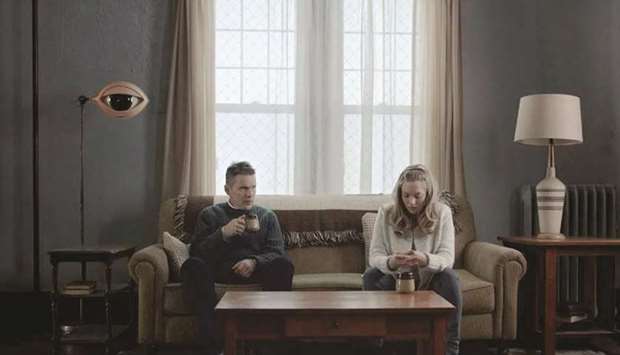It’s also one of those third-act miracles all too rare in American filmmaking. Now 71, writer-director Schrader has remained busy across five decades. He made a name for himself when Martin Scorsese pulled a vicious American masterwork from Schrader’s screenplay Taxi Driver. A critic and essayist before (and, to a degree, concurrent with) his moviemaking career, Schrader has plowed through bowl after bowl of forbidden fruit in a variety of genres. His latest work bears little surface resemblance to the pulpy extremes of so many Schrader pictures, both early (Rolling Thunder, which he co-wrote and later disowned) and recent (Dog Eat Dog, The Canyons).
Nonetheless, the extremes of temperament and the atmosphere of coiled danger are there in First Reformed, just under the surface calm. You may not appreciate the direction it goes, ultimately, or make the leap alongside the story’s protagonist, played by Ethan Hawke, at the unnerving close of a carefully calibrated crisis of faith. But it’s a beautiful crisis to witness, and to argue with internally.
Schrader keeps the film, set in upstate New York, visually close to his chief inspirations. The Rev. Ernst Toller is a man at a crossroads. He tends the radically dwindling attendees of his tiny Dutch Reformed church outside Albany, down the road from its parent establishment, the thriving megachurch known as Abundant Life.
Like the isolated man of faith in Robert Bresson’s Diary of a Country Priest (1951), Toller has embarked on a yearlong experiment of keeping a journal for his private confessions, doubts and prayers. Early in the film Toller is visited by Mary (Amanda Seyfried), a pregnant parishioner married to a fierce environmental activist (Philip Ettinger) recently returned to town, and utterly adrift. With climate change raging, unchecked, he does not see the point of bringing a child into the world. The early, artfully sustained scene between the husband and the minister is pretty amazing, slipping in bits of exposition (we learn of Toller’s son, a casualty of the Iraq war; Toller himself is a former military chaplain) while Toller murmurs to us in voice-over about the ecstatic thrill of having his beliefs and ideology questioned, tested, probed.
That storyline intersects with an imminent celebration. The church, now primarily a tourist attraction, is turning 250 years old. For its re-consecration, a parade of dignitaries is being arranged by Abundant Life’s spiritual leader (Cedric Kyles, aka Cedric the Entertainer). There’s a shadowy figure of power in the background, a petroleum executive (Michael Gaston) who donates mightily to the megachurch. In a particularly rich scene, the oil exec locks horns with Toller, and the conservative man of business reveals that he can smell a meddling liberal of conscience a mile off.
I’m being evasive about narrative details, not because Schrader constructs First Reformed like a mystery, exactly, but because its very real qualities of strangeness deserve a process of discovery. Toller’s encounter with the troubled eco-activist, who turns out to be an extreme example of the breed, changes him in small and large ways. Toller, who is not a well man, has a turbulent past (Victoria Hill plays a onetime lover, a choir director at Abundant Life) bleeding into an increasingly addled and fraught present.
Hawke has never been better. I’ve found much of his screen work mannered and overeager, in both drama and comedy, but here all is lean, and unvarnished, and thoughtfully compelling. Seyfried and Kyles are exemplary, maintaining a tone of quiet gentleness even when their hearts are breaking a little for the man of the cloth in their midst.
Schrader freely acknowledges the forerunners of First Reformed. In Ingmar Bergman’s Winter Light (1963), a pastor contends with a man tortured by visions of nuclear apocalypse. In Carl Dreyer’s Ordet (1955), religious transcendence and ordinary despair feed each other, affecting the characters in different ways. Schrader lifts from both. These are all stories of men, inhabiting stark, bare-walled rooms where they can be alone with their angst. Schrader’s very much at home in these rooms. And yet First Reformed stakes out its own obsessive path, toward an ending that is uniquely Paul Schrader. (I don’t think it’s entirely successful; by design it’s abrupt but it feels rhythmically off.)
Shooting on Long Island, NY, the film’s cinematographer, Alexander Dynan, responds to Schrader’s pristine compositions with precise shades of sunlight and interior shadows. Toller is in nearly every shot, and Hawke builds his portrait of a good man, lost, piece by piece. For such a deliberate exercise in a specific, methodical style, First Reformed is oddly bracing, full of unresolved, contradictory, vital ideas. The answers it provides hardly apply to the general flock, so to speak. But a spiritual inquiry can only care so much about the general audience. It’s too busy trying to work things out for itself.
— The Chicago Tribune/TNS

